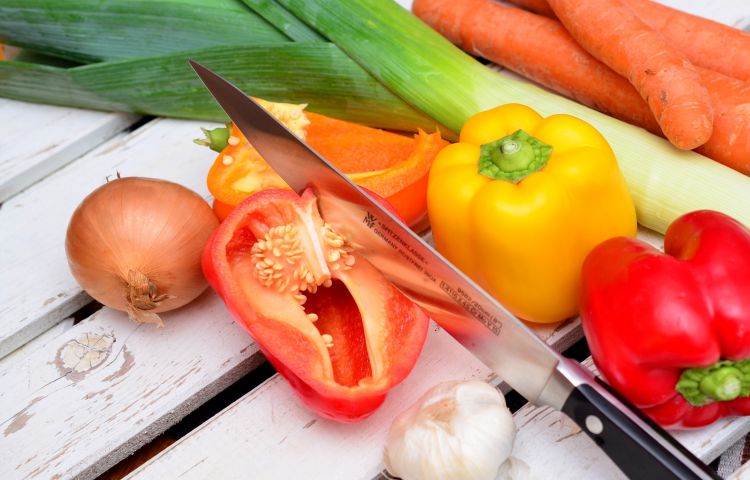 It’s no secret that most of us are preoccupied with what we’re putting into our mouths these days. Around half of all Americans over the age of 20 have attempted to lose weight in the past year, whether that’s a long-term diet or an attempt at the latest dietary fad.
It’s no secret that most of us are preoccupied with what we’re putting into our mouths these days. Around half of all Americans over the age of 20 have attempted to lose weight in the past year, whether that’s a long-term diet or an attempt at the latest dietary fad.
Unfortunately, finding ways to improve your diet can be easier said than done. With the media reporting each up-and-coming food trend and revolutionary diet plan, how can you tell what foods should actually be on your plate?
We’ve put together a quick guide to some simple, tried-and-true tactics to help you eat healthier day in and day out. Try getting into the habits below for a better diet in no time!
1. Get More Fruits and Vegetables
It’s hard to talk about healthier eating without mentioning this basic strategy: getting more fruits and vegetables on your plate.
If you’re hoping to make a quick but simple change, there’s no better option than this one, and for several reasons.
First off, fruits and vegetables are packed with the nutrients you need to fuel your daily life, from vitamins and minerals to antioxidants and fiber. Plus, the fiber in these foods can help you feel full for longer, meaning you may not be as inclined to reach for an unhealthy snack after you’ve downed a serving of your favorite fruit or vegetable.
An easy way to get more fruits and vegetables into your diet is to keep more of them within reach: stock your home with grab-and-go options like berries and bananas, and chow down on easy veggie snacks like baby carrots with hummus.
2. Chow Down on Nuts and Seeds
Nuts and seeds may be easy to overlook, but they’re tiny nutritional powerhouses! Boasting high quantities of healthy fats, vitamins, and other beneficial nutrients, nuts, and seeds can be a great choice for anyone aiming for a better diet.
Note, of course, that many nuts are high in calories, so it’s always a good idea to make sure you’re getting appropriate serving sizes.
3. Eat More Portions of Fish
Because red meat is such a staple in the American diet, many of us don’t turn to seafood as often as we should. Depending on where you live, it may even be difficult to find fresh seafood in certain seasons.
However, getting more fish onto your plate is well worth the effort!
This is especially true of fish with high quantities of oil, such as trout, salmon, herring, and mackerel. These types of fish include omega-3 fats, which researchers have found to help prevent heart disease and other serious health conditions. That’s in addition to a wealth of additional health benefits of seafood.
4. Dial Back the Salt
It’s easy to get into the habit of shaking salt onto your plate without thinking about it—but do you really need the extra sodium? By refraining from adding salt to your plate for a few days, it’s possible to train your taste buds to need less salt. Give it a shot to avoid worrying symptoms like high blood pressure, kidney disease, and more.
5. Cut Down on Processed Foods
It’s no secret that processed foods with added artificial ingredients can be damaging to your health. During processing, many manufacturers strip foods of essential vitamins and minerals, swapping them for salt and sugars instead.
Note that there’s a spectrum when it comes to processed foods: foods like white flour, cheese, and milk may be processed, but they retain many essential nutrients. On the other hand, ultra-processed foods like hot dogs, cookies, and deli meats tend to include a spectrum of unwanted ingredients that you don’t want in your body. Get in the habit of reading the labels on your favorite foods to know what you’re eating!
6. Switch to Water
Depending on your health habits, this may be a tough sell, but switching to water over other drinks can be a great way to get less sugar into your diet. Beverages like sodas, fruit juices, and coffees also tend to contain empty calories that can contribute to unwanted weight gain.
7. Be More Mindful
In today’s busy world, many of us find ourselves in front of a screen while we put food into our mouths. However, this type of distracted eating can lead to overeating if we’re not careful!
Instead of checking out during your meals, try staying present in the moment. For some people, this may mean slowing down to focus on the food, getting more enjoyment out of the meal itself. Others may prefer to spend time with people in their home, using the meal as a break from their busy day.
8. Plan Ahead
It’s easy to slip into bad habits when you’re rushing to put a meal together each day. Instead of grabbing easy but unhealthy foods during a bout of hunger, take some time to plan your meals in advance.
Meal prep can be a great way to take control of your diet, and it’s not hard to get started. All you’ll need is a little free time to prepare in advance, and you’ll have simple and healthy meals to eat for the next few days!
9. Eat Meals You Actually Enjoy
This may be the most important tip of all: plan the meals you want to eat! If you’re hoping to make a long-term habit out of healthy eating, it needs to be sustainable—which will only happen if you’re looking forward to your next meal. With a little research, you can find healthy recipes that are both nutritious and satisfying, allowing you to benefit from great health while delighting your taste buds.
Find Better Ways to Eat Healthier
At the end of the day, fad diets may come and go, but the expert-backed tips above are here to stay. Finding ways to sneak nutritious foods into your diet, prepare your meals in advance, and eat more of what you love can help you eat healthier for years to come. Get started today to improve your health bit by bit!
Looking for more of the health and fitness tips you need to know? Be sure to check out our other guides for additional insights.




